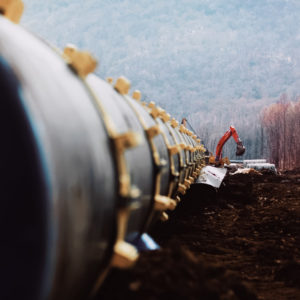Delaware Valley legislators long opposed to the Mariner East pipeline project have seized on a leak of a non-toxic drilling fluid into a local lake to yet again call on the project to be shut down and for a “reappraisal” of all pipeline projects in the entire state.
In a letter to the Department of Environmental Protection, state Rep. Danielle Friel Otten (D-Chester) and state Sen. Katie Muth (D-Chester/Montgomery) joined six of their fellow Democratic legislators in a letter to the Wolf administration calling for the pipeline’s permits to be pulled.
“Energy Transfer has spilled an estimated 10,000 gallons of proprietary drilling mud of undisclosed composition into a tributary to a drinking water source, recreation area, and wildlife habitat at Marsh Creek State Park. Enough is enough. It is time to pull Energy Transfer’s permits in Chester County,” the letter reads.
“We are calling for an immediate halt to all activity related to the Mariner East project, a revocation of all Energy Transfer/SPLP permits in Chester County, and a reappraisal of all ongoing and future pipeline projects in the Commonwealth.”
In a statement responding to the leak, Energy Transfer spokesperson Lisa Coleman said, “We recognize the importance of this waterbody and are committed to allocating all necessary resources to fully remediate and restore the area; which includes removing the non-toxic bentonite clay and water mix — sometimes referred to as ‘drilling mud.’”
Coleman also noted that despite complaints to the contrary, “no public drinking water has been impacted.”
The $3 billion, 350-mile-long natural gas liquids pipeline project began construction in February 2017 by Sunoco, which is now owned by Energy Transfer. There have been several snags in the project, but it has created numerous jobs and has substantially added to the state’s tax revenue.
The main component of the leaked drilling fluid was bentonite, a nontoxic substance that in large quantities creates muddy waters, which could impact miniscule aquatic life. However, the Pennsylvania Department of Environmental Protection (DEP) says there have been no fish kills nor danger to humans from the leak.
“Since the spill occurred on Monday, clean-up crews have made significant progress in collecting and containing spilled material,” DEP Secretary Patrick McDonnell said. “Downstream drinking water intakes have been notified and there are no concerns about drinking water safety. There have not been any complaints of impacted private water wells.”
This has not stopped pipeline opponents from using the non-toxic leak as a reason to once again call for an end to the Mariner East project.
“The HDD [horizontal direct drilling] process had been used by Sunoco in a way that led to a lot of spills, very much like this, that in some instances had contaminated people’s private wells that resulted in a lot of damage to private property and damage to the environment,” Clean Air Coalition senior litigation attorney Alex Bomstein told Delaware Valley Journal.
“We warned the Pennsylvania DEP a year ago… that Sunoco’s own geologists thought there was a moderate to high likelihood of a drilling fluid spill happening.”
Bill Godsey a Texas geologist and environmental scientist, said the drilling fluid leaked through cracks in the drilled rock has created “an inadvertent return, which occurs when you are drilling the boring and your drilling fluids go outside the boring, like through a dead root or a crack or some other kind of opening where the mud gets outside of the bore hole itself.”
“They’re actually drilling horizontally underneath the grounds, which is a lot more effective and less destructive way of traversing the land,” Godsey told Delaware Valley Journal. “When you have naturally sensitive areas, such as wetlands, you use the horizontal drilling technique, you use what is called ‘native mud’ or bentonite fluid.
“But let’s say you are drilling in limestone and the limestone is fractured itself and had cracks in it, then the bentonite — if the cracks are small enough — will form a seal and keep the water from leaking out,” said Godsey, who formerly was the chief geologist for the Texas Railroad Commission. “But if the cracks are big enough, the bentonite will flow through the crack and come out somewhere. And if it comes out to the ground surface that’s called an inadvertent return.”
On Thursday evening, the left-leaning nonprofit Food & Water Watch and six other environmental groups called a “Community Townhall on Dangerous Pipelines & Spills.” About 150 people logged onto the town hall, which mostly focused on the history of — and protests against — Mariner East in general. Legislators Friel Otten and Muth also participated.
“We have very little regulation when it comes to industry and so it’s easy to come into Pennsylvania and take our resources, and exploit our communities, our workers, our natural resources,” Friel Otten, told the virtual town hall. “And so we’ve come up against a lot of serious challenges with these pipelines.”
Godsey said he has reached a conclusion as to why so many people, who he refers to as “pseudo-environmentalists” are up in arms about last week’s leak.
“It’s just a way to protest and create ill will towards pipelines.”

